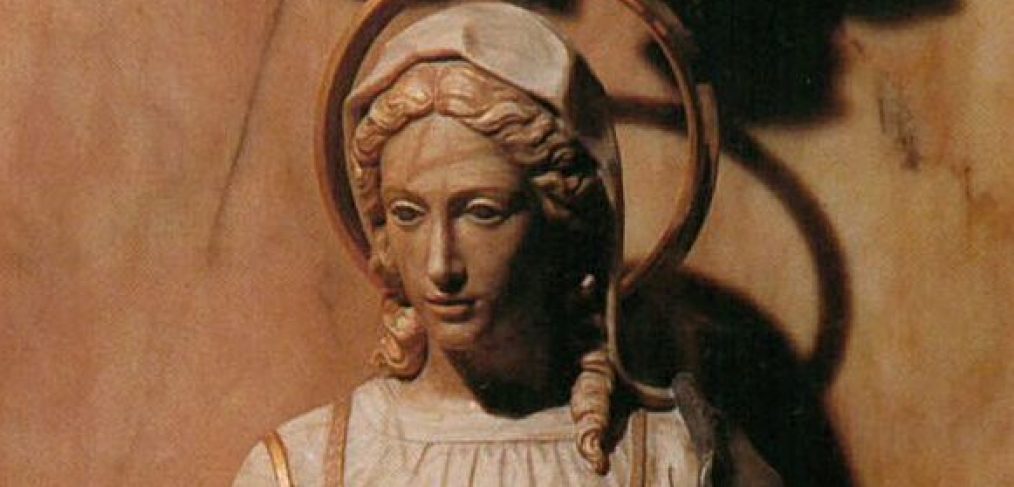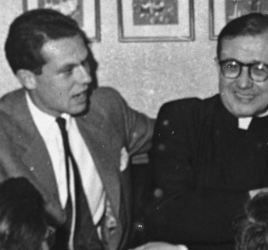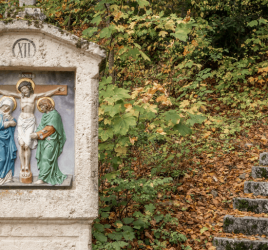
Even Saints Have Their Own Saints
Have you ever thought about what kind of relationship two saints would have had if they had met while they were alive? Perhaps it’s hard to imagine this scenario of one saint befriending another saint from centuries earlier, but, logistics aside, we can explore this concept to grasp how a living saint perceives and is influenced by a deceased saint. This understanding enhances the significance of both saints’ legacies and highlights the enduring impact of their examples. Two such saints that are discussed in this article are St. Catherine of Siena and St. Josemaria Escriva. St. Josemaria’s deep reverence and unwavering devotion to St. Catherine significantly influenced his teachings and the foundational principles of Opus Dei.
It is widely recognized that St. Josemaria held a profound admiration for St. Catherine of Siena. Due to this deep connection, he affectionately referred to his personal reflections as catalinas or “catherines” — private notes where he would jot down thoughts for later contemplation during prayer or as insights drawn from his meditations: “These are candid notes—Catherines, I called them, in honor of the saint of Siena—which for a long time I wrote kneeling down, and which served me as reminders and wake-up calls. I think that, as a rule, when I was writing with that childlike simplicity, I was praying” (The Founder of Opus Dei, Vol. 1, p. 255). St. Josemaria not only sought St. Catherine of Siena as a personal inspiration, but also expressed her example’s significance in his writings and teachings. St. Josemaria wrote in a letter to the members of Opus Dei, dated 1932: “The saints are always uncomfortable people, men and women (my Saint Catherine of Siena!) who because of their example and words are a continual source of unease for the consciences of those immersed in sin.”
St. Josemaria admired the frankness with which Catherine defended the truth. He considered this sincerity a fundamental virtue. He wrote in a letter, “I am sure that there will be some who will not easily forgive me for speaking so clearly, but I must be true to my conscience and to God, out of love for the Church, out of loyalty to the Holy Church and because of my affection for you. I have a special devotion to Saint Catherine—that great ‘grumbler’! —because she refused to stay silent and spoke great truths out of love for Christ, for God’s Church and for the Roman Pontiff” (Letter, 29 September 1957, no. 49). St. Josemaria was struck by St. Catherine’s unconditional love for the Church, which in turn, was the driving force that prompted him to speak so frankly himself. We find evidence of this in the homily “Loyalty to the Church,” delivered on June 4, 1972: “The Catholic Church is roman. I savor that word, roman! I feel completely roman, since roman means universal, catholic. For it leads me to love tenderly the Pope, il dolce Cristo in terra, as Saint Catherine of Siena, whom I count as a most beloved friend, liked to say.”
Despite frequently offering stern criticism in her personal interactions and various writings regarding priests who strayed from their vocation, St. Catherine maintained profound respect and deep admiration for the priesthood. In St. Josemaria’s homily Priest for Eternity on April 13, 1973, the founder of Opus Dei cites a key text: “The priesthood leads one to serve God in a state which, in itself, is no better or worse than any other: it is simply different. But the priestly vocation is invested with a dignity and greatness which has no equal on earth. Saint Catherine of Siena put these words on Jesus’ lips: ‘I do not wish the respect which priests should be given to be in any way diminished; for the reverence and respect which is shown them is not referred to them but to Me, by virtue of the Blood which I have given to them to administer. Were it not for this, you should render them the same reverence as lay people, and no more… You must not offend them; by offending them you offend Me and not them. Therefore I forbid it and I have laid it down that you shall not touch my Christs.’”
While other intercessors of the Work, such as Saint Pius X, Saint Nicholas of Bari, Saint John Mary Vianney, and Saint Thomas More, had already been chosen in previous years, it seems that the idea of invoking Saint Catherine for the apostolate of public opinion came to the founder in 1964, as evidenced by a letter addressed to Don Florencio Sanchez Bella, then counselor of Opus Dei in Spain, on May 10 of the same year: “I want to let you know that my devotion to Saint Catherine of Siena, which I have had for a long time, has recently grown even stronger: because she knew how to love the Pope with a filial love, because she knew how to serve the Holy Church of God with so much sacrifice and… because she knew how to speak out heroically. I am thinking of declaring her our patroness (intercessor) in heaven for our apostolates of public opinion. We shall see!”
St. Josemaria establishes that St. Catherine would act as an intercessor to obtain from God the courage to be a witness to the truth: “Another intercessor that you will invoke for the apostolate of public opinion: Saint Catherine of Siena. She was a woman who, out of love for the Church of God, faced Popes and heads of state. Learn from her.” Furthermore, in another similar letter addressed to the members of Opus Dei dated July 8, 1964, he explains: “As intercessor of our apostolates of public opinion, we have chosen Saint Catherine of Siena because she was a woman who, out of love for the Church of God, faced Popes and heads of state. Ask her to obtain for us from God the courage to be witnesses to the truth.”
St. Josemaria’s relationship with St. Catherine of Siena underscored the importance of courageous leadership within the Church. Just as St. Catherine boldly confronted corruption and complacency during her lifetime, always guided by her deep love for Christ and the papacy, St. Josemaria championed the need for unwavering loyalty and transparency in the service of the Church. He saw the frankness of St. Catherine not as mere criticism, but as a profound expression of love and dedication to the truth. This courageous stance, modeled by St. Catherine, influenced St. Josemaria’s own pastoral mission, driving him to encourage others to live with the same passion for truth and loyalty to the Church. His legacy, much like Catherine’s, is a call to engage with the Church in a way that is both heartfelt and uncompromising, rooted in a sincere devotion to Christ and the universal mission of the Catholic faith.
The deep reverence St. Josemaria held for St. Catherine of Siena is unmistakable, and their spiritual connection is marked by mutual admiration and shared devotion to the Church’s mission. Both saints, though living centuries apart, were united by a common goal: to illuminate the world with the truth, love, and teachings of Christ. St. Josemaria’s veneration for St. Catherine was not just a passing sentiment but a profound bond that shaped his spiritual life, as reflected in his writings and personal reflections. Their legacy, rooted in courage and conviction, continues to resonate deeply within the hearts of the faithful. By their example, we are reminded that even in different eras, the call to serve God remains timeless. Together, their influence endures, inspiring generations to live with purpose, faith, and unwavering dedication to Christ and His Church.
Image: St. Catherine of Siena (Detail); Altarpiece of the Shrine of Torreciudad, Spain.




